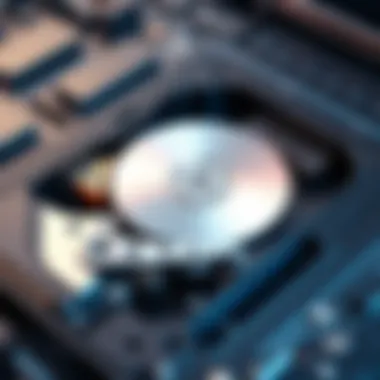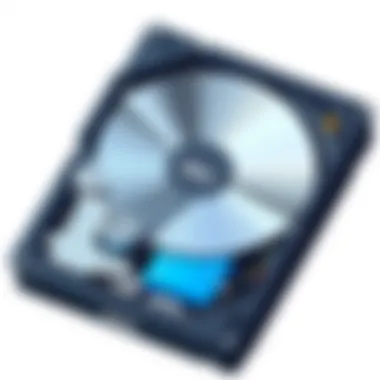Exploring the Dell Inspiron 1545 Hard Drive


Intro
In today’s world, a laptop is more than just a means to get online; it’s a central hub for work, entertainment, and communication. The Dell Inspiron 1545, in particular, packs a punch with its design and specifications. But what keeps this machine running smoothly? The answer lies within its hard drive.
Understanding the hard drive's components and functionalities is crucial for anyone looking to optimize their Dell Inspiron 1545 experience. From upgrading storage to troubleshooting issues, this guide aims to unveil the intricacies of the hard drive tailored for this specific laptop model. Readers will gain insights into performance metrics, compare it with alternatives, and explore essential maintenance techniques to ensure longevity.
Let’s dive deeper into this essential aspect of computer hardware and uncover how it plays a pivotal role in your laptop’s performance as we explore the:
- Key features that make the Inspiron 1545's hard drive stand out.
- Technical specifications that define its capabilities.
- Pricing information to help potential buyers make informed choices.
With a measured approach, we’ll also address common concerns, offering real-world insights and guidance that truly resonate with tech enthusiasts and casual users alike.
Prologue to Dell Inspiron Hard Drive
The hard drive serves as the cornerstone of any laptop, and the Dell Inspiron 1545 is no exception. Understanding this component is crucial not just for tech enthusiasts, but also for casual users who rely on their machines for everyday tasks. This article sheds light on the hard drive in the Inspiron 1545, exploring its specifications, upgrade potentials, and common challenges users face.
Overview of the Inspiron
The Dell Inspiron 1545, released during the late 2000s, has garnered a reputation for being a reliable and cost-effective laptop. With its broad spectrum of uses—ranging from basic office tasks to light gaming—this model is tailored for a variety of consumers. The hard drive, in particular, plays a pivotal role in how swiftly applications run and how much data can be stored. Users often find themselves evaluating whether to keep their existing setup or upgrade to a more robust storage solution, such as a Solid State Drive (SSD). Understanding the nuances of the hard drive not only enhances performance but also extends the device’s longevity.
Importance of Hard Drive in Laptop Functionality
When considering laptop performance, the hard drive is often overlooked. However, it fundamentally influences several aspects:
- Speed: The speed of data retrieval directly affects how fast your laptop boots up, loads programs, and accesses files. A sluggish hard drive can lead to frustrating delays, impacting productivity.
- Capacity: Storage capacity is vital for accommodating everything from operating systems to personal files. Insufficient space can lead to system slowdowns or, worse, data loss during critical moments.
- Reliability: A dependable hard drive minimizes the risk of data corruption and unforeseen failures, which can cause significant headaches for users.
"A good hard drive can be the difference between a smooth sailing experience and a mid-crisis panic when things go south."
Ultimately, keeping an eye on the hard drive’s health and considering its specifications can lead to better decision-making about upgrades and maintenance. Thus, this exploration into the Dell Inspiron 1545's hard drive is not just a technical dive, but a necessary map for users who wish to enhance their laptop experience.
Technical Specifications of the Hard Drive
Understanding the technical specifications of the hard drive in your Dell Inspiron 1545 is crucial for anyone looking to either properly utilize, upgrade, or maintain their laptop. These specifications not only define how well your system operates but also inform potential buyers about what to expect from their device. Key elements include how much data the hard drive can hold, how fast it can read and write information, and what type of connections are used. Getting a grip on these factors aids both tech enthusiasts and casual users in making informed decisions that suit their specific needs and preferences.
Storage Capacity Options
When it comes to storage in the Dell Inspiron 1545, you have a few choices. Typical configurations might range from 160GB to even 1TB, allowing you to pick a size that fits your lifestyle. If you’re a casual user that mainly browses the web or streams movies, perhaps a smaller hard drive suffices. However, gamers or content creators often require more space to house their games, software, and assets.
Some points to consider:
- 160GB: Basic storage, fits everyday use.
- 500GB: Good middle ground for users with moderate needs.
- 1TB: Ideal for gamers and professionals with large files.
Upgrading to a larger capacity can make a world of difference, especially if you're noticing that your current drive is frequently running low on space. Just remember, choosing the right capacity means thinking ahead about what you might need in the future.
Disk Speed and Performance Metrics
The speed of the hard drive is just as important as its storage capacity. The Inspiron 1545 typically uses 5400 RPM drives, which can feel a tad sluggish when compared to the faster 7200 RPM options that other machines may offer. While 5400 RPM works for basic tasks, it can bottleneck performance during heavy operations like gaming or rendering videos.


Moreover, performance metrics depend not only on RPM but also on other factors:
- Read/Write Speeds: Look for specifications stating sequential read/write speeds. The faster these numbers, the quicker your data will transfer.
- Access Time: This is critical for loading applications and files instantly. Look for lower access times if performance is a priority.
Investing in an SSD, if feasible, can vastly improve performance metrics and loading times, providing a noticeable speed boost in everyday operations.
Interface Types: SATA vs IDE
When discussing the interface types that connect your hard drive to the motherboard, it’s essential to distinguish between SATA and IDE.
SATA (Serial ATA) is the more modern interface in use today, which supports higher speeds and is more efficient compared to its predecessor, IDE (Integrated Drive Electronics). Here’s a quick comparison:
- SATA: Generally supports faster speeds, making booting and data transfer quicker, which is a godsend when you need your files in a jiffy.
- IDE: An older standard found mainly in legacy systems; slower and less efficient, thus not recommended unless absolutely necessary for compatibility purposes.
For the Inspiron 1545, the SATA interface is the standard choice, and if considering an upgrade, it’s advisable to stick with SATA options to enjoy the best performance potential.
"Choosing the right hard drive can greatly enhance your laptop experience, allowing for smoother multitasking and quicker load times."
A well-informed decision about the hard drive's technical specifications goes a long way toward optimizing and future-proofing your Dell Inspiron 1545. As storage technology continues to adapt, keeping an eye on these details will help ensure that your system remains capable of supporting your needs.
Common Hard Drive Types Compatible with Inspiron
When considering upgrades or replacements for the hard drive in your Dell Inspiron 1545, understanding the different types available is crucial. The right hard drive not only enhances performance but can also extend the lifespan of your laptop. Whether you're a tech enthusiast, a casual user, or a gamer, choosing the appropriate hard drive type can make all the difference in your computing experience.
HDD vs SSD: Differences and Advantages
The two primary types of hard drives you may consider are Hard Disk Drives (HDD) and Solid State Drives (SSD). Each offers distinct features and benefits that cater to different user needs.
Hard Disk Drives (HDD)
- Mechanism: HDDs use spinning magnetic disks to read and write data. This mechanical nature may lead to slower access times, especially as they age.
- Capacity: These drives tend to offer larger storage capacities at a lower price point, making them a popular choice for those needing ample space without breaking the bank.
- Ideal for: Users who store large files like videos, photos, and music archives, where speed isn’t the utmost priority.
Solid State Drives (SSD)
- Mechanism: Unlike HDDs, SSDs have no moving parts. They store data on flash memory, which allows for much faster read and write speeds.
- Performance: This translates into quicker boot times and faster application launches, giving a noticeable boost to overall system performance.
- Ideal for: Gamers and users who run resource-intensive applications that benefit from quick access times.
In summary, if you value performance and speed, an SSD may be the superior choice. However, if you require a more extensive storage solution without a hefty price tag, an HDD might suit you better.
Recommended Hard Drive Brands
Selecting a reputable brand can significantly contribute to the performance and reliability of your hard drive. Here are several brands well-regarded for their quality and durability:
- Seagate: Known for a wide range of HDDs and hybrids; a solid option for both capacity and reliability.
- Western Digital: Offers both HDDs and SSDs, with a good reputation for performance and longevity.
- Samsung: Renowned in the SSD market, Samsung provides excellent performance, especially for gamers and demanding applications.
- Crucial: A well-respected name in the SSD sphere, Crucial is recognized for affordability and solid performance.
- Toshiba: Provides a variety of drives, making them a versatile choice for users needing both HDDs and SSDs.
When picking a hard drive, keep in mind the specifications that align with the Inspiron 1545’s compatibility, such as size and interface. This research aids in making a decision beneficial for your individual usage patterns.
"Choosing the right hard drive can be the difference between a laptop that runs smoothly and one that lags behind—make that choice wisely!"


Overall, whether opting for an HDD or SSD, your choice of a reliable brand will not only solve storage problems but also enhance the functionality of your Dell Inspiron 1545. Stay informed and choose wisely based on your unique demands!
Installing a New Hard Drive
Switching out your old hard drive for a new one can seem daunting, particularly for users of the Dell Inspiron 1545. However, understanding this process is crucial as it can dramatically enhance the performance of your laptop. Not only do new hard drives offer increased speed, they also often provide more storage capacity and reliability, which are essential for today's demanding applications.
One of the prime reasons for installing a new hard drive is to upgrade to a solid-state drive (SSD). SSDs can significantly speed up boot times and loading times for applications compared to traditional hard disk drives (HDDs). But even if you’re looking to replace an HDD with another HDD, knowing how to successfully carry out the installation process is vital. In this section, you will be walked through the steps to successfully swap out your hard drive and the tools you’ll need for the job.
Step-by-Step Installation Guide
- Power Down and Unplug Your Laptop: Always start by shutting down your Dell Inspiron 1545 completely. Unplug the power adapter and remove the battery (if applicable). This is crucial for your safety and to preserve the hardware.
- Gather Necessary Tools: Typically, you will need a small Phillips head screwdriver and possibly an anti-static wrist strap to avoid any damage from static electricity (more about that later).
- Access the Hard Drive Compartment: Flip the laptop over and locate the hard drive compartment cover. Unscrew the screws holding the cover in place. Take care to keep these screws in a safe spot.
- Remove the Old Hard Drive: Gently disconnect the old hard drive from its slot by carefully lifting it out while ensuring not to yank any connectors.
- Insert the New Hard Drive: Position the new hard drive in the compartment. It should slide in easily. Secure it with screws to hold it in place.
- Reattach the Cover: Once the new drive is securely in place, put the compartment cover back on and screw it tightly.
- Reinsert the Battery and Power on the Laptop: After all is where it should be, reinsert the battery if you removed it, plug the laptop back in, and power it on. Your system should recognize the new hard drive right away.
- Format and Set Up the Drive: If it's your first time setting up this hard disk, you may have to go into your computer’s management settings to format the drive and partition it as needed.
Required Tools and Precautions
Before jumping into installation, there are certain items you'll need:
- Screwdriver: A small Phillips head screwdriver is typically all you need.
- Static Wrist Strap: This helps prevent any electrostatic discharge which may harm your computer components.
- Soft Cloth or Surface: To prevent scratches to your laptop and to lay down screws and tools.
- New Hard Drive: Make sure it’s compatible with the Dell Inspiron 1545.
Notice: Taking precautions is important. Make sure to handle all components gently and avoid touching the circuit boards to prevent damage. Conducting this process in an environment free of dust and humidity is always a good step forward.
Having the right tools and understanding the steps involved can greatly reduce any frustration when installing a new hard drive in your Dell Inspiron 1545. Being methodical ensures that everything runs smoothly!
For further assistance, consider visiting community forums such as Reddit or check out documentation from the official Dell support page. These sources can provide valuable insights and troubleshooting assistance.
Troubleshooting Common Hard Drive Issues
Troubleshooting hard drive issues in the Dell Inspiron 1545 is a crucial skill for anyone keen on ensuring their laptop runs smoothly. The hard drive is like the heart of your computer; it stores all the vital components that keep everything ticking. When problems arise, identifying the symptoms early can prevent further damage and save users from potential data loss.
Diagnosing Drive Failure Symptoms
When the hard drive starts to fail, it doesn’t always send out a loud alarm. Instead, symptoms may creep up on you quietly. Here are some telltale signs:
- Frequent Freezes and Crashes: If your System feels sluggish, or applications abruptly close, it might be a sign of a failing drive.
- Strange Noises: Sounds that resemble clicks, grinding, or whirring could indicate mechanical failure.
- Blue Screen of Death (BSOD): This infamous screen could signal that the hard drive is struggling to communicate with the motherboard or experiencing corruption.
It’s wise to keep an eye on these symptoms. If they're occurring often, it’s high time you took an action.
Error Messages and Their Meanings
Error messages can be cryptic, but deciphering them can provide vital clues to the underlying issues with the hard drive. Some common messages you might encounter include:
- "No Bootable Device": This suggests that your laptop cannot find the operating system. Typically, the hard drive might be disconnected or corrupted.
- "Disk Read Error": This indicates that the read/write head of the drive is having a tough time accessing data.
- "Sector Not Found": This usually points to bad sectors on the drive, making data recovery a concern.
Understanding these messages can help in identifying the exact nature of the problem, leading to a quicker resolution.
Data Recovery Options
In case the worst happens and data is lost, staying calm and knowing what to do is critical. Here are some options for data recovery:


- DIY Recovery Software: Tools like Recuva or EaseUS Data Recovery Wizard can be a lifesaver for recovering lost files.
- Professional Recovery Services: If the data is irreplaceable, don't hesitate to consult professionals. But be prepared; it could cost a pretty penny.
- Backup Solutions: Always have a backup plan, whether that’s an external drive or cloud storage. It’s better to be safe than sorry!
To sum it up, troubleshooting hard drive issues isn't just about fixing immediate concerns. It's about fostering a proactive approach to maintaining your Dell Inspiron 1545, ensuring longevity and smooth operation.
“An ounce of prevention is worth a pound of cure.”
- Benjamin Franklin
For more comprehensive insights on laptop maintenance, you might consider checking Wikipedia or Reddit for community discussions.
Optimizing Hard Drive Performance
When it comes to laptops, the hard drive often plays a critical role in overall performance. In the case of the Dell Inspiron 1545, ensuring your hard drive is operating at peak efficiency can lead to noticeable improvements in speed and reliability. Optimizing hard drive performance is not just about speed; it’s about longevity, data integrity, and making sure that the device meets the demands of various applications and tasks.
Best Practices for Maintenance
Taking care of your hard drive involves a combination of regular maintenance habits and the right techniques to keep performance levels high. Some foundational practices include:
- Regular Backups: Make it a routine to back up important data. Use Cloud services or external hard drives so that you don’t risk losing valuable information.
- Disk Cleanup: Utilize built-in tools to delete unnecessary files. This can free up space and simplify your storage.
- Defragmentation: If you're using a traditional HDD, defragmenting it periodically can help improve read/write speeds. Though this isn't necessary for SSDs, it can do wonders for the mechanical drives typical with Inspiron 1545.
- Ventilation: Ensure proper airflow around your laptop. Heat can impede performance and even lead to damage over time. Keeping your laptop on a hard surface can help with cooling.
- Component Inspection: Open the laptop occasionally to check for dust buildup. Cleaning it out can prevent overheating and subsequent performance issues.
Adopting these practices not only improves performance but also helps extend the lifespan of your hard drive, ensuring that your laptop serves you well over the years.
Software Tools for Monitoring Health
With the right software tools, monitoring the health of your hard drive can be simple and effective. Here are a few tools that stand out:
- CrystalDiskInfo: This software provides a detailed report on the condition and performance metrics of your hard drive, including temperature and health status based on SMART data.
- HWMonitor: This tool offers real-time health monitoring of your system's components, including the hard drive temperature, which is essential for avoiding potential issues before they escalate.
- Defraggler: Besides defragmentation, it provides insights into your current hard drive’s fragmentation levels, helping you make timely decisions on maintenance.
- CCleaner: This is an efficient cleanup tool that also includes monitoring capabilities, allowing you to keep an eye on drive usage and performance overall.
Using these tools periodically can give you peace of mind. They serve as an early warning system for any problems that might arise, ensuring that you keep your Dell Inspiron 1545 running smoothly.
"Maintaining your hard drive's health is not just about fixing issues; it's about creating an environment where issues are less likely to happen in the first place."
By incorporating these optimization techniques and making use of the right software, users can significantly enhance the performance of their Dell Inspiron 1545's hard drive. This will culminate in a more responsive, reliable, and enjoyable computing experience.
Ending
In wrapping up our thorough exploration of the hard drive within the Dell Inspiron 1545, it becomes clear just how vital this component is to the overall functionality and performance of the laptop. The hard drive is not merely a storage vessel; it serves as the heartbeat of your device, directly influencing speed, reliability, and user experience.
Summary of Key Points
Throughout this article, we have delved into several critical aspects:
- Technical Specifications: Understanding storage capacities, speeds, and interfaces helps users make informed choices when selecting or upgrading their hard drives.
- Installation and Troubleshooting: We covered a step-by-step guide for replacing hard drives and diagnosing common issues that may arise, leading to better maintenance practices.
- Optimization Strategies: Keeping the hard drive in tip-top shape with regular maintenance and using the right software tools can prolong its life and enhance performance.
The combination of these components makes it clear that being well-informed about your Inspiron 1545's hard drive can significantly impact your computer experience.
Final Recommendations for Users
For those who own a Dell Inspiron 1545, here are some final thoughts:
- Regularly back up your data to prevent loss from drive failures. Consider using an external hard drive or cloud storage for a second layer of security.
- When upgrading, choose a hard drive that meets your needs best—whether that's speed, capacity, or endurance. Brands like Samsung and Western Digital have good reputations for quality.
- Utilize monitoring tools, such as CrystalDiskInfo, to keep tabs on your hard drive’s health, ensuring you are proactive rather than reactive.
Ultimately, understanding the hard drive of your Dell Inspiron 1545 equips you with the knowledge to maintain, upgrade, and optimize your laptop effectively. Having this awareness not only helps in day-to-day tasks but also enhances your overall computing experience. Stay informed, and treat your device with the attention it deserves!



